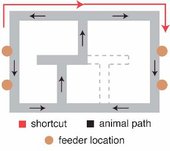Highlight
Hippocampal Replay Isn't Just Rehearsal
Achievement/Results
An experiment by IGERT trainee Anoopum Gupta of Carnegie Mellon University and his advisors and collaborators at Carnegie Mellon and the University of Minnesota has uncovered a surprising fact about the hippocampus, a brain structure involved in memory formation. In rodents, the hippocampus had previously been shown to replay sequences of locations the animal had visited previously. Replay could occur in either the forward or backward direction. It was previously thought that this replay phenomenon was a rehearsal mechanism to facilitate transferring traces of the animal’s recent experience to long term memory. Gupta’s experiment showed that rats are doing more than rehearsing recent experiences.
In this experiment, conducted in the laboratory of Professor A. David Redish at the University of Minnesota, rats made repeated paths through a figure-eight maze, stopping along the way to collect rewards at feeding stations. An electrode in the rat’s brain recorded the activity of cells in its hippocampus. In some sessions the rat was required to repeatedly run up the central stem of the maze and always turn left; while in other sessions it had to always turn right. In a third type of session, the rat had to alternate between left and right turns. Each rat ran two sessions per day, of different types.
When the rat paused at the feeding stations, its hippocampus would replay representations of trajectories through the maze, as predicted by previous experiments. But surprisingly, the rats did not favor recent trajectories. A rat that had run all left turn trajectories in its first session and was running all right turn trajectories in its second session was more likely to replay left turn trajectories, representing the left half of the maze, while sitting at the feeding station in the right half of the maze. Thus, recency of experience does not explain how the hippocampus chooses sequences to replay.
Even more surprising, Gupta et al. found that rats sometimes replayed shortcut trajectories they had never actually experienced, such as proceding from the top left corner of the maze to the top right corner. The shortcuts were composed of a forward replay of part of one trajectory followed by a backward replay of part of another, or vice versa. This ability to synthesize novel trajectories suggests that the hippocampus is doing more than just rehearsal. It appears to be involved in a kind of mental exploration that enriches the animal’s cognitive map, possibly laying the groundwork for more flexible navigation and novel routes in the future.
The study was published in the March 11, 2010 issue of the journal Neuron. Gupta is an MD/PhD student in the University of Pittsburgh’s Medical Scientist Training Program and Carnegie Mellon University’s Robotics PhD Program, specializing in computational neural modeling. He was able to receive training in neurophysiological recording by a National Science Foundation IGERT (Integrative Graduate Education and Research Training) fellowship. His co-authors on the paper were his advisor, Professor David S. Touretzky of Carnegie Mellon, and Professor A. David Redish and postdoctoral researcher Dr. Matthijs van der Meer of the University of Minnesota.
Address Goals
This work gives new insight into the function of the hippocampus, one of the most intensely studied regions of the brain because of its regular structure and the crucial role it plays in memory.
In addition, the work nicely exemplifies the interdisciplinary nature of IGERT training. Mr. Gupta did his undergraduate degree in electrical engineering and is pursuing a doctorate in robotics, where he is specializing in computational modeling of the hippocampus. The IGERT fellowship allowed him to spend time in a neurophysiology lab getting hands-on experience in neural recording. This training has given him a deeper understanding of experimental neuroscience, as well as providing crucial new data that are now the focus of his modeling efforts.







